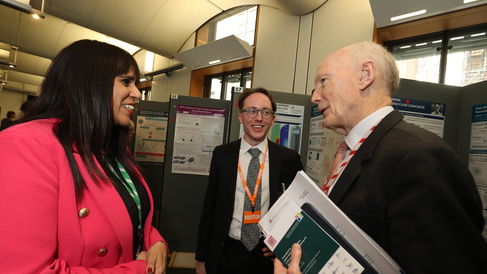
CIRG member Callum White recently attended the STEM for BRITAIN 2025 exhibition organised by the Parliamentary and Scientific Committee at the Houses of Parliament as a finalist in the Engineering category.
STEM for BRITAIN is a significant scientific poster competition and exhibition that has taken place in Parliament since 1997. Chaired by George Freeman MP, its purpose is to provide members of both Houses of Parliament with insight into the “ground-breaking and frontier” research being conducted in UK universities and to elevate the profile of Britain’s early-stage researchers. The event receives sponsorship and attendance from various organisations, including The Institute of Physics, The Royal Academy of Engineering, The Council for the Mathematical Sciences, United Kingdom Research and Innovation, and The Isaac Newton Institute.
Callum had the opportunity to present his research from the Concrete Infrastructure Research Group to members of both Houses and connect with other researchers from across the UK, thereby raising awareness of various research areas.
Callum’s poster, “Flow with the know: digitally decoding fluid concrete”, presented the stark reality of construction waste, with some 20% of total UK construction costs spent fixing errors. A significant factor in this figure is that we simply do not understand enough about the materials we use daily. Callum’s work focuses on improving knowledge of concrete behaviour. Concrete is a fluid that hardens over time to become a high-strength material; Callum believes we have a window of opportunity when the concrete is still fluid to detect and remedy issues before the concrete sets. Callum’s PhD has developed a digital test system for fluid concrete, which vastly improves upon the insights of existing site-based tests. It provides comparable insights to laboratory testing systems for a fraction of the cost. Using the system gives deeper insights into the material's behaviour, driving improved quality control. Members of the houses were impressed with the idea and the significant scope for commercialisation.
On the event, Callum said: “At the STEM for Britain event, I had a unique chance to engage directly with policymakers discussing the obstacles facing the construction sector, especially in achieving Net Zero goals. Members from both houses were genuinely interested in my research, particularly the potential of the proposed technologies to address long-standing issues. Visiting the Houses of Parliament was a fantastic experience. I especially appreciated discussing various topics with fellow early career researchers, ranging from the physics of nuclear reactors to innovative cancer therapies.”
Photo credits: John Deehan Photography and the Parliamentary and Scientific Committee
